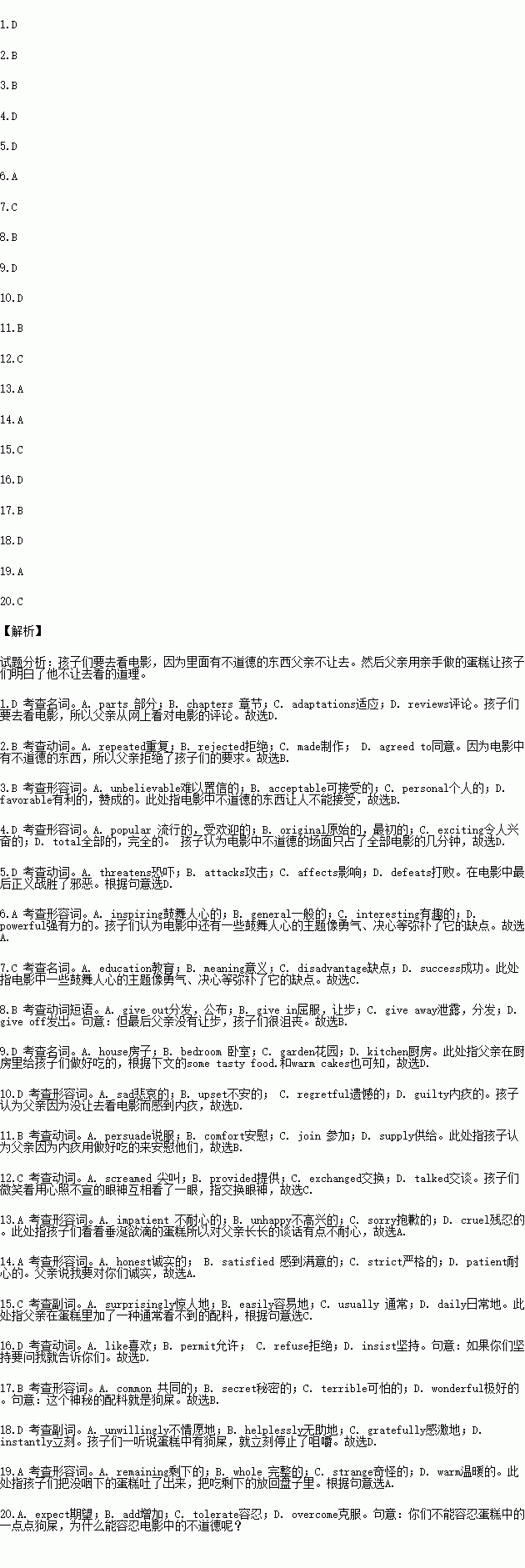题目内容
完形填空
阅读下面短文,从短文后各题所给四个选项(A、B、C和D)中,选出可以填入空白处的最佳选项,并在答题卡上将该项涂黑。
Two excited kids begged their father for his permission to see a film. Having read some________ about the movie on the Internet, he firmly ________ their request with the reason that movie presents immorality (不道德) as being ________ . “But dad, those scenes are merely a few minutes of the ________ film, in which good________ evil eventually. In addition, there are other ________ themes like courage and determination making up for its ________ !”
But the father didn’t ________ , and the two teenagers were cast down. Then they heard the sounds of their father preparing something in the ________ . One of the teenagers said, “Dad must be feeling ________ , and now he’s trying to ________ us with some tasty food.” Soon their father appeared with a plate of warm cakes and said, “Before you eat, I want to tell you something: I love you both so much.”
The teenagers smiled and ________ with each other knowing glances. Dad was softening. Looking at the mouth-watering cake, the two boys were getting ________ about the father’s long speech. “But I want to be ________ with you. I added one ingredient (配料) that is not________ found in cakes.”
“To make it more delicious? Oh, come on, Dad! Please just tell us what it is.”
“OK, if you ________ . That ________ ingredient is dog waste.”
Both teens ________ stopped chewing the cake, spit it out and dropped the ________ cake back on the plate.
“DAD! Why did you do that?”
“That is the same reason why I won’t allow you to watch that movie. You won’t ________ a little dog waste in your cake, so why should you put up with a little immorality in your movies?”
1.A. parts B. chapters C. adaptations D. reviews
2.A. repeated B. rejected C. made D. agreed to
3.A. unbelievable B. acceptable C. personal D. favorable
4.A. popular B. original C. exciting D. total
5.A. threatens B. attacks C. affects D. defeats
6.A. inspiring B. general C. interesting D. powerful
7.A. education B. meaning C. disadvantage D. success
8.A. give out B. give in C. give away D. give off
9.A. house B. bedroom C. garden D. kitchen
10.A. sad B. upset C. regretful D. guilty
11.A. persuade B. comfort C. join D. supply
12.A. screamed B. provided C. exchanged D. talked
13.A. impatient B. unhappy C. sorry D. cruel
14.A. honest B. satisfied C. strict D. patient
15.A. surprisingly B. easily C. usually D. daily
16.A. like B. permit C. refuse D. insist
17.A. common B. secret C. terrible D. wonderful
18.A. unwillingly B. helplessly C. gratefully D. instantly
19.A. remaining B. whole C. strange D. warm
20.A. expect B. add C. tolerate D. overcome


 use more of the product in an effort to correct the problem, which just makes things even worse. Doctor Ly says some chemicals are so dangerous that they may lead to blackened fingernails, infections(感染) and serious skin damage.
use more of the product in an effort to correct the problem, which just makes things even worse. Doctor Ly says some chemicals are so dangerous that they may lead to blackened fingernails, infections(感染) and serious skin damage.